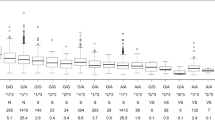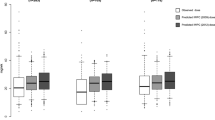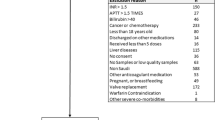Abstract
To optimize the warfarin dose, a population-specific pharmacogenomic algorithm was developed using multiple linear regression model with vitamin K intake and cytochrome P450 IIC polypeptide9 (CYP2C9*2 and *3), vitamin K epoxide reductase complex 1 (VKORC1*3, *4, D36Y and −1639 G>A) polymorphism profile of subjects who attained therapeutic international normalized ratio as predictors. New algorithm was validated by correlating with Wadelius, International Warfarin Pharmacogenetics Consortium and Gage algorithms; and with the therapeutic dose (r=0.64, P<0.0001). New algorithm was more accurate (Overall: 0.89 vs 0.51, warfarin resistant: 0.96 vs 0.77 and warfarin sensitive: 0.80 vs 0.24), more sensitive (0.87 vs 0.52) and specific (0.93 vs 0.50) compared with clinical data. It has significantly reduced the rate of overestimation (0.06 vs 0.50) and underestimation (0.13 vs 0.48). To conclude, this population-specific algorithm has greater clinical utility in optimizing the warfarin dose, thereby decreasing the adverse effects of suboptimal dose.
This is a preview of subscription content, access via your institution
Access options
Subscribe to this journal
Receive 6 print issues and online access
$259.00 per year
only $43.17 per issue
Buy this article
- Purchase on Springer Link
- Instant access to full article PDF
Prices may be subject to local taxes which are calculated during checkout


Similar content being viewed by others
References
El Rouby S, Mestres CA, LaDuca FM, Zucker ML . Racial and ethnic differences in warfarin response. J Heart Valve Dis 2004; 13: 15–21.
Kamali F . Genetic influences on the response to warfarin. Curr Opin Hematol 2006; 13: 357–361.
Kaminsky LS, Zhang ZY . Human P450 metabolism of warfarin. Pharmacol Ther 1997; 73: 67–74.
Higashi MK, Veenstra DL, Kondo LM, Wittkowsky AK, Srinouanprachanh SL, Farin FM et al. Association between CYP2C9 genetic variants and anticoagulation-related outcomes during warfarin therapy. JAMA 2002; 287: 1690–1698.
Rieder MJ, Reiner AP, Gage BF, Nickerson DA, Eby CS, McLeod HL et al. Effect of VKORC1 haplotypes on transcriptional regulation and warfarin dose. N Engl J Med 2005; 352: 2285–2293.
Harrington DJ, Gorska R, Wheeler R, Davidson S, Murden S, Morse C et al. Pharmacodynamic resistance to warfarin is associated with nucleotide substitutions in VKORC1. J Thromb Haemost 2008; 6: 1663–1670.
Gage BF, Eby C, Johnson JA, Deych E, Rieder MJ, Ridker PM et al. Use of pharmacogenetic and clinical factors to predict the therapeutic dose of warfarin. Clin Pharmacol Ther 2008; 84: 326–331.
Wadelius M, Chen LY, Lindh JD, Eriksson N, Ghori MJ, Bumpstead S et al. The largest prospective warfarin-treated cohort supports genetic forecasting. Blood 2009; 113: 784–792.
Epstein RS, Moyer TP, Aubert RE, O Kane DJ, Xia F, Verbrugge RR et al. Warfarin genotyping reduces hospitalization rates results from the MM-WES (Medco-Mayo Warfarin Effectiveness study). J Am Coll Cardiol 2010; 55: 2804–2812.
Lee SC, Ng SS, Oldenburg J, Chong PY, Rost S, Guo JY et al. Interethnic variability of warfarin maintenance requirement is explained by VKORC1 genotype in an Asian population. Clin Pharmacol Ther 2006; 79: 197–205.
Jose R, Chandrasekaran A, Sam SS, Gerard N, Chanolean S, Abraham BK et al. CYP2C9 and CYP2C19 genetic polymorphisms: frequencies in the south Indian population. Fundam Clin Pharmacol 2005; 19: 101–105.
International Warfarin Pharmacogenetics Consortium Klein TE, Altman RB, Eriksson N, Gage BF, Kimmel SE et al. Estimation of the warfarin dose with clinical and pharmacogenetic data. N Engl J Med 2009; 360: 753–764.
Moyer TP, O'Kane DJ, Baudhuin LM, Wiley CL, Fortini A, Fisher PK et al. Warfarin sensitivity genotyping: a review of the literature and summary of patient experience. Mayo Clin Proc 2009; 84: 1079–1094.
Yuen E, Gueorguieva I, Wise S, Soon D, Aarons L . Ethnic differences in the population pharmacokinetics and pharmacodynamics of warfarin. J Pharmacokinet Pharmacodyn 2010; 37: 3–24.
Loebstein R, Dvoskin I, Halkin H, Vecsler M, Lubetsky A, Rechavi G et al. A coding VKORC1 Asp36Tyr polymorphism predisposes to warfarin resistance. Blood 2007; 109: 2477–2480.
Limdi NA, Wadelius M, Cavallari L, Eriksson N, Crawford DC, Lee MT et al. Warfarin pharmacogenetics: a single VKORC1 polymorphism is predictive of dose across 3 racial groups. Blood 2010; 115: 3827–3834.
Kimura R, Miyashita K, Kokubo Y, Akaiwa Y, Otsubo R, Nagatsuka K et al. Genotypes of vitamin K epoxide reductase, gamma-glutamyl carboxylase, and cytochrome P450 2C9 as determinants of daily warfarin dose in Japanese patients. Thromb Res 2007; 120: 181–186.
Scott SA, Jaremko M, Lubitz SA, Kornreich R, Halperin JL, Desnick RJ . CYP2C9*8 is prevalent among African-Americans: implications for pharmacogenetic dosing. Pharmacogenomics 2009; 10: 1243–1255.
Cen HJ, Zeng WT, Leng XY, Huang M, Chen X, Li JL et al. CYP4F2 rs2108622: a minor significant genetic factor of warfarin dose in Han Chinese patients with mechanical heart valve replacement. Br J Clin Pharmacol 2010; 70: 234–240.
D'Ambrosio RL, D'Andrea G, Cappucci F, Chetta M, Di Perna P, Brancaccio V et al. Polymorphisms in factor II and factor VII genes modulate oral anticoagulation with warfarin. Haematologica 2004; 89: 1510–1516.
Acknowledgements
This study was supported by the Ramanujan Fellowship, Department of Science and Technology (DST), Government of India, awarded to VK Kutala.
Author information
Authors and Affiliations
Corresponding author
Ethics declarations
Competing interests
The authors declare no conflict of interest.
PowerPoint slides
Rights and permissions
About this article
Cite this article
Pavani, A., Naushad, S., Rupasree, Y. et al. Optimization of warfarin dose by population-specific pharmacogenomic algorithm. Pharmacogenomics J 12, 306–311 (2012). https://doi.org/10.1038/tpj.2011.4
Received:
Revised:
Accepted:
Published:
Issue Date:
DOI: https://doi.org/10.1038/tpj.2011.4
Keywords
This article is cited by
-
Pharmacogenetic determinants of warfarin in the Indian population
Pharmacological Reports (2021)
-
Association between VKORC1 gene polymorphism and warfarin dose requirement and frequency of VKORC1 gene polymorphism in patients from Kerman province
The Pharmacogenomics Journal (2020)
-
Non-genetic factors and polymorphisms in genes CYP2C9 and VKORC1: predictive algorithms for TTR in Brazilian patients on warfarin
European Journal of Clinical Pharmacology (2020)
-
Genetic polymorphisms and dosing of vitamin K antagonist in Indian patients after heart valve surgery
Indian Journal of Thoracic and Cardiovascular Surgery (2019)
-
Follow-up and management of valvular heart disease patients with prosthetic valve: a clinical practice guideline for Indian scenario
Indian Journal of Thoracic and Cardiovascular Surgery (2019)



